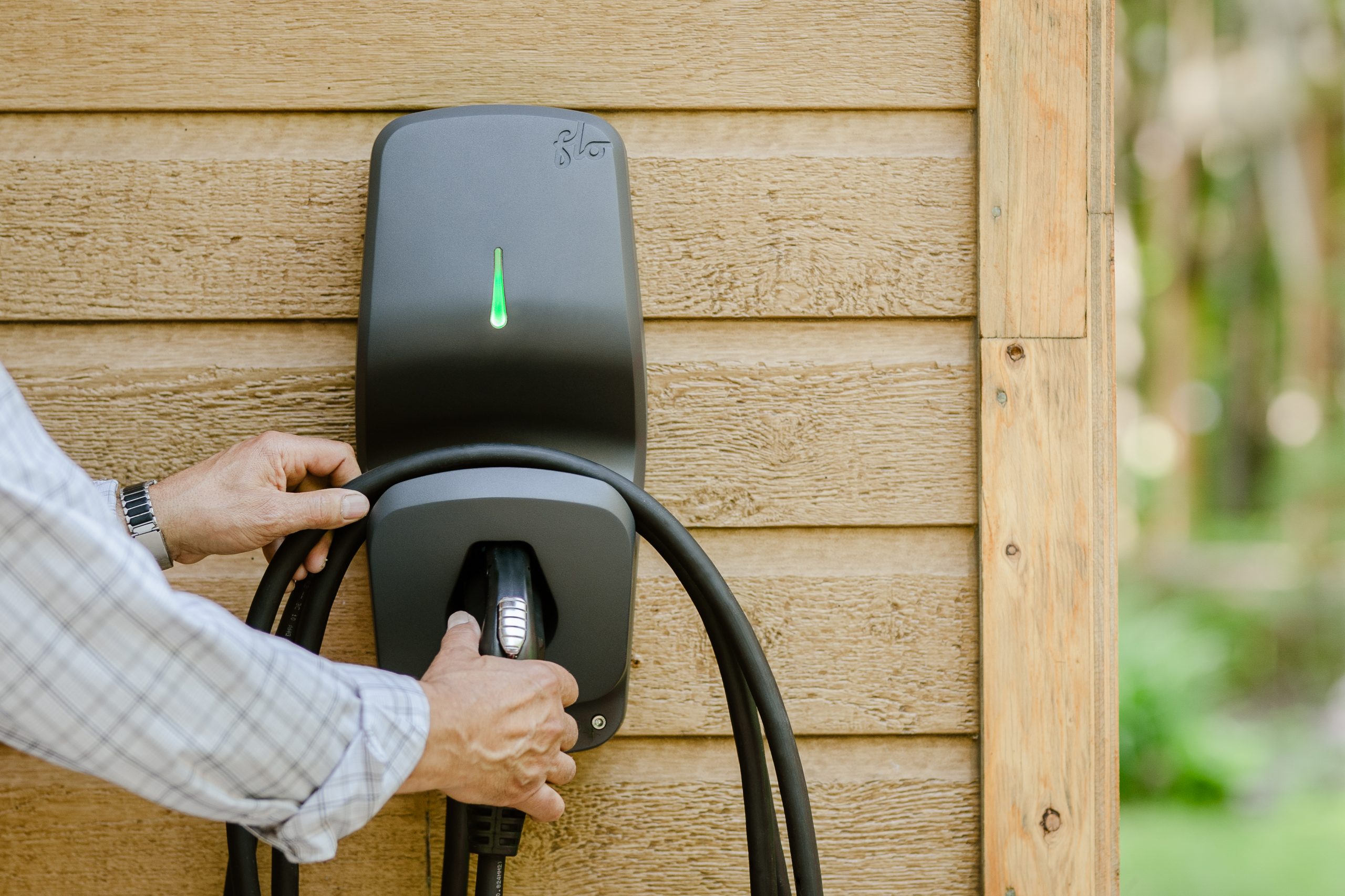Storage Tank Water Heaters vs. Tankless: Which is Best For Your Business?8 min read
Reading Time: 7 minutesWhich Type of Water Heater Best Suits Your Commercial Facility?
From the largest department store to the smallest hair salon or bistro, businesses of all kinds depend on their water heaters on a day-to-day basis. Though these pieces of mechanical equipment operate out of sight and mind, they certainly become noticeable if they malfunction or decline in performance and efficiency.
In order to help business owners and property managers better understand water heaters, the options that are available and which may work best for them, we’ve put together this blog to compare and contrast different models.
As a starting point, it’s important to understand the two basic types of water heater systems: Storage tank water heaters and Tankless water heaters. While they both serve the same function, they differ significantly in how they operate.
CONTACT RELIANCE COMMERCIAL SOLUTIONS TODAY! >>
Browse This Content:
1. How Do Hot Water Heaters Work in Commercial Settings?
2. Storage Tank vs. Tankless Water Heaters
How Do Storage Tank Water Heaters Work?
Common Types of Storage Tank Water Heaters Used in Commercial Settings
How Do Tankless Water Heaters Work?
3. Which Type of Water Heater is Right for My Business?
4. Should I Buy or Rent a Water Heater for My Business?
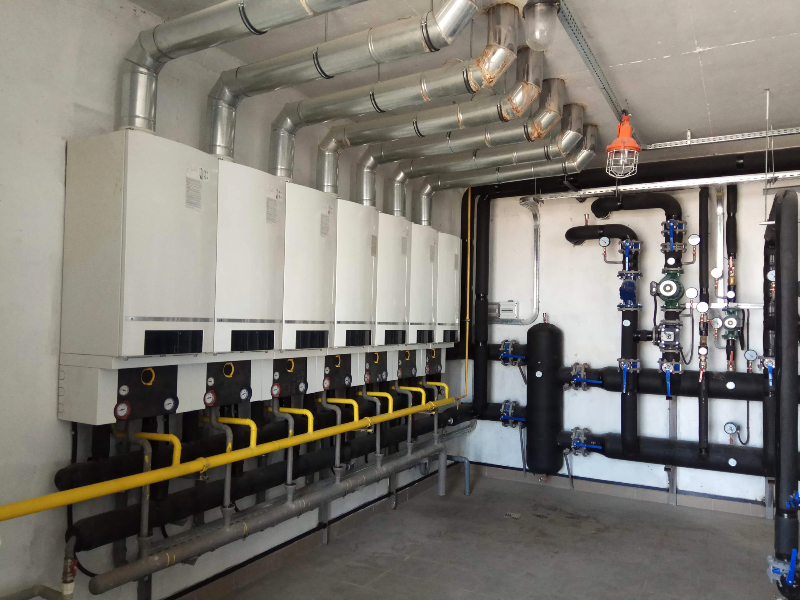
How Do Hot Water Heaters Work in Commercial Settings?
At the simplest level, water heaters raise the temperature of water so it can be used comfortably and effectively. From washing dishes and cleaning surfaces to washing a customer’s hair and cleaning hands before returning to work, commercial settings use water heaters every day in a variety of essential use cases.
Most water heaters use one of three potential fuel sources to perform their basic functions. These are:
Electricity:
If your place of business is heated by electricity, there is a good chance that it also uses an electric water heater. Electric water heaters use electricity to heat up elements which in turn heat the water. Electric water heaters are easy to install and, unlike propane- and natural gas-powered water heaters, do not require venting.
Natural Gas:
Water heaters powered by natural gas units use a burner controlled by a gas valve and a thermostat to heat water which can then be used where it is needed in your facility. The exhaust gases produced by this process must then be vented. Natural gas water heaters typically cost more than electrical units, but they may offer savings in the long run depending on local energy prices. In Ontario, natural gas can be one of the most economical ways to heat the water in your facility.
Propane:
Propane water heaters are powered by the same processes that power natural gas water heaters.

Storage Tank vs. Tankless Water Heaters
While the basic fuel sources are the same for most water heaters, the units themselves can differ quite significantly. Comparing storage tank water heaters vs. tankless water heaters is a useful way to see how differently water heaters can operate.
How Do Storage Tank Water Heaters Work?
The most common type of water heater in both commercial and domestic settings, storage tank water heaters are likely the models you are most familiar with. These units heat and store water in large tanks so that a supply of hot water is readily available. As the hot water flows out of the tank for use, new water flows into the tank to ensure a continuous supply.
Though the storage tank aspect is consistent across these types of systems, there are different types of storage tank water heaters that vary based on their fuel/power source. Here’s a look at the most common types:
Common Types of Storage Tank Water Heaters Used in Commercial Settings
Electric Storage Tank Water Heaters: An electric water heater uses electricity to heat water in the tank and does not require venting, offering more flexibility for installation locations. That said, depending on utility rates, many customers prefer natural gas water heaters due to running costs in areas where natural gas is available.

Power-Vented Gas Water Heaters: A power vented water heater uses a motorized blower to push exhaust gasses through pipes that can be vented out of the side or roof of a building, offering more flexibility for installation locations compared to conventionally vented water heaters.
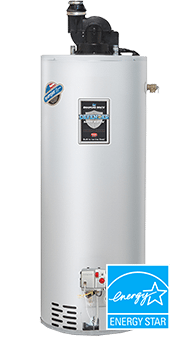
Conventional Gas Storage Tank Water Heaters: A conventional water heater is vented vertically through the roof or chimney of a building where exhaust gasses naturally rise out through the pipe. This requires very specific installation locations that are close to existing vertical vents.
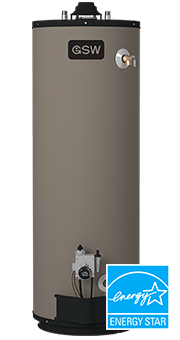
Heat Pump Electric Water Heaters: Instead of generating heat directly, heat pump water heaters use electricity to transfer heat from one place to another. These systems pull heat from the air in a surrounding space — such as a basement or mechanical room — and transfer it to the tank of water to heat it up.
How Do Tankless Water Heaters Work?
In contrast to storage tank water heaters that heat and store water regardless of whether it is being used, tankless water heater systems heat water on demand through the use of a heat exchanger. They work as follows:
1. The system is activated when you turn on a faucet, dishwasher, shower, or other hot water-consuming appliance
2. The tankless system heats cold intake water by passing it through a heat exchanger
3. Once no longer needed, the system shuts down and cold water stops running through the heat exchanger
The burners in tankless water heater systems are typically fueled by propane or natural gas. These gases are used to heat up the heat exchanger. While they are typically more expensive than storage tank water heaters, they are also generally more energy efficient.
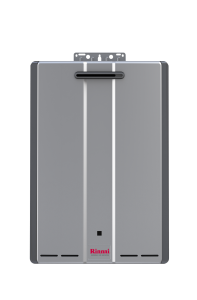
CONTACT RELIANCE COMMERCIAL SOLUTIONS TODAY! >>
Which Type of Water Heater is Right for My Business?
Every commercial facility or space is unique. Regardless of whether you’re running a salon, retail store or restaurant, your water heater will have to meet different requirements and satisfy unique demands. As a result, let’s have a look at different factors that can potentially determine which water heater system is right for your needs and priorities.
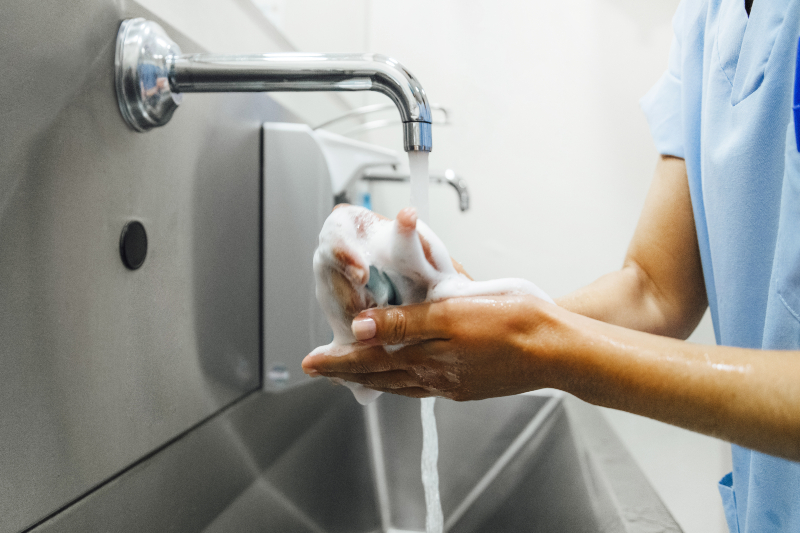
Tankless Water Heaters Are More Energy-Efficient
For businesses that prioritize leaner utility bills and who don’t typically place rigorous demands on their water heaters, tankless systems could be the best option. Why? Because tankless systems have the potential to run more efficiently than their storage tank counterparts.
Think about it: as soon water sits in a tank, it begins to lose heat. As a result, traditional storage tank systems are continually turning on and off to keep water warm and ready to go. Because tankless systems heat water only when it’s needed, they can be more energy-efficient. In fact, some models start at an energy factor of 0.94, which means 94% of the fuel is being used to heat the water and only 6% is wasted. The result? A tankless water heater could lower your energy bill.
Tankless Water Heaters Can Help Your Business Save Space
For commercial spaces with a small footprint, tankless systems are an excellent way to save space while not sacrificing the availability of hot water. Traditional storage tank water heaters can be quite large and a burden in smaller commercial spaces. Conversely, tankless systems hang on the wall, up and out of the way of foot traffic and usable space.

Storage Tank Water Heaters Can Accommodate More Demand
While efficiency and space-saving are undeniable benefits of tankless systems, storage tank water heaters are less limited by output in higher-demand commercial applications. In restaurants or salons that constantly use hot water in a variety of applications, often all at the same time, a high-efficiency storage tank system may make more sense.
However, for businesses drawn to the benefits of tankless systems, there is also the option of installing multiple tankless systems. Tankless hybrid models are also available, which combine the benefits of a tankless system with a small storage tank.
Tankless Systems Can be More Expensive & Require Special Installation
Because the switch to a tankless system is a switch in technology, there may be some additional costs to consider to get tankless heaters installed in your place of business. What’s more, tankless water heaters often require new venting and gas lines as part of the installation.
Should I Buy or Rent a Water Heater for My Business?
Ensuring you are getting good performance out of your water heating system is both necessary and potentially costly. From repairs and maintenance to purchasing and installation, there are major costs to consider when dealing with water heaters, regardless of whether you choose a storage tank or a tankless system.
Buying a water heater will involve upfront costs and you will be responsible for the cost of maintenance and repairs. On the other hand, renting from Reliance Commercial Solutions™ means you can take advantage of a Water Heater Rental plan, which offers free standard installation† as well as long-term protection for an affordable monthly price. You can also rest easy knowing your equipment is backed by an industry leader that has delivered excellent service and results for over 60 years.
To learn more about water heaters and the numerous benefits that come with our rental plans, get in touch with a Reliance representative today!
CONTACT RELIANCE COMMERCIAL SOLUTIONS TODAY! >>
Learn More About Water Heaters on Our Blog!
1. A Guide to Commercial Electric Water Heaters: How They Work | Types | Energy Efficiency


